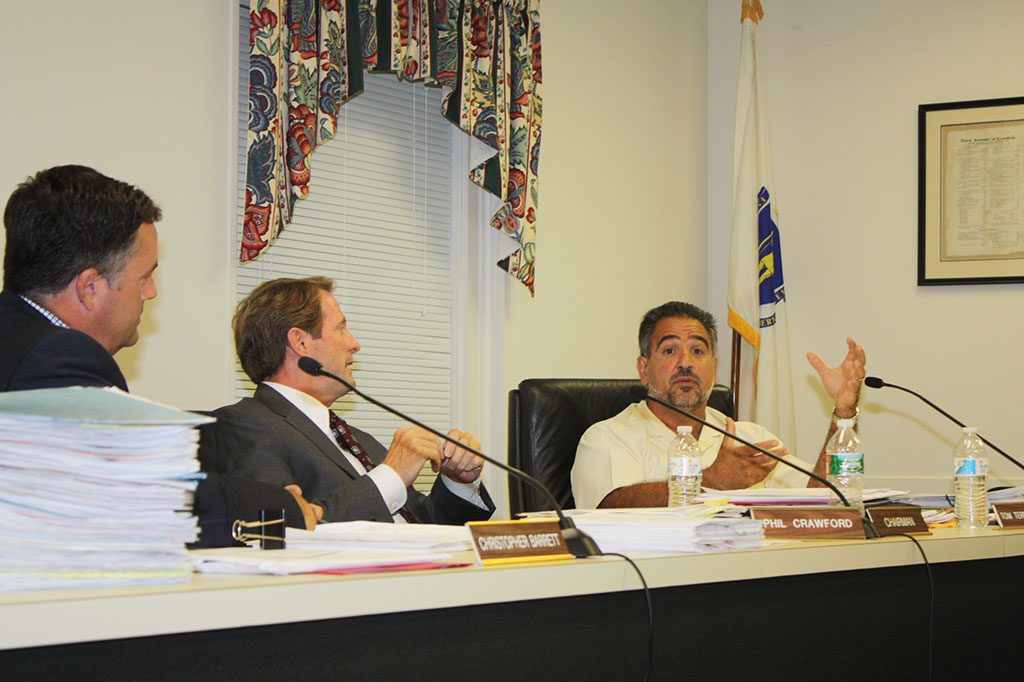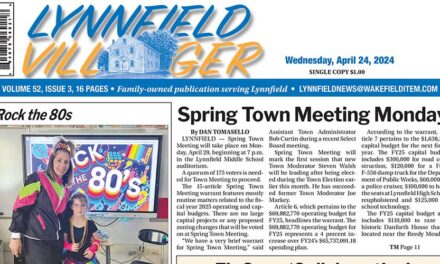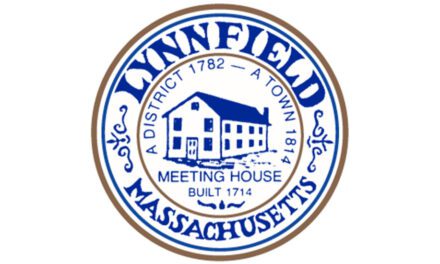Published in the September 16, 2015 edition

SELECTMAN Tom Terranova (far right) emphasizes his position on the citizens’ petition he supports that seeks a Town Charter change to expand the Board of Selectmen from three members to five during a heated debate at last week’s meeting. Selectmen Chris Barrett and Phil Crawford listen before making their counter arguments. (Maureen Doherty Photo)
By MAUREEN DOHERTY
LYNNFIELD — A contentious debate erupted between the selectmen and their respective supporters in the audience during a discussion on the citizens’ petition seeking to expand the membership of the board from three to five.
The olive branch extended between the selectmen earlier in the meeting during their united front against the Kinder Morgan gas pipeline was visibly fractured and ultimately snapped in two during the hour-long debate.
Upon announcing the opening of the warrant for the Fall Town Meeting by Selectmen Chairman Phil Crawford, fellow Selectman Tom Terranova announced that his citizens’ petition calling for a Town Charter change to increase the number of selectmen by two had been certified by Town Clerk Trudy Reid and would be included in the warrant. He added that its language was reviewed and approved by Town Counsel Tom Mullen.
Just 10 signatures of registered Lynnfield voters was necessary to get the question on the warrant.
Town Administrator Jim Boudreau explained that the way this petition is drafted if it passes at Town Meeting under state law it will be “a home rule petition to the legislature which will require approval by both the House and Senate and the signature of the Governor.”
Boudreau said if it is passed as written it could take effect as soon as the April 2016 election in which Terranova’s existing three-year seat is up for re-election and two additional seats would become available. If the article was amended on the floor of Town Meeting to require a local ballot election to pass the charter change, that question would be placed on the April 2016 election ballot. If successfully passed, the two additional seats would be up for election in April of 2017.
Crawford was critical of the proposal from the outset.
“So you’re going to present a warrant article to increase the board of selectmen without any reasoning, without any discussion, without any public meetings, without any involvement of the electorate in the town,” Crawford asked Terranova. “You’re not asking the people to vote on it, something that affects the entire town, and you’re asking to circumvent the process that you want to promote in all your paraphernalia – ‘Your voice counts’ and ‘Be heard.’ But you’re doing the opposite here. You’re doing something where the people that would vote on it aren’t going to get the chance to vote on it.”
Terranova countered that the reasoning behind it was the “two votes that the Board of Selectmen made that overruled the townspeople’s votes that gave rise to people pretty much begging for this to occur. Personally, I’ve talked to well over 100 people and only received two negative comments.”
Crawford said since a typical October Town Meeting attracts about 200 people and perhaps about 400 will show up for this meeting, by skipping over the ballot question and going to the legislature the majority of the town’s 8,500 voters will not have a voice in the matter.
Resident Patricia Campbell said she thought it would ultimately come back to a town ballot question after it passed Town Meeting and the legislature. But Crawford and Boudreau both pointed out that was not correct. “This, as drafted, does not go to a ballot,” Boudreau said.
Crawford said, “They’re asking the town not to vote on it…so 200 people are going to change the Town Charter. According to the rules of a home rule charter, this should go to a town ballot.”
Terranova said he talked about the options with Mullen over a month ago. “I wanted this to take effect as soon as possible; that was my goal,” he said.
Selectman Chris Barrett said he wanted to understand the thought process behind a “change of this magnitude” and he would have preferred to have heard about it from Terranova himself or the town administrator that signatures were being collected for this, not from someone who called him up after being approached to sign the petition.
“A number of people called me up. I want to know what’s broken. We’ve gotten positive comments about how we’re working tonight,” Barrett said.
“That’s tonight. What do we do about votes people have voted for, not you, but the Board of Selectmen have overrode two votes. One was the MarketStreet paper street and the second was giving two budgets for the people to review, and both of those were overridden by selectmen votes,” Terranova said.
“How will a five-member Board of Selectmen help that situation? What if you get three or four selectmen who are supportive of what you say is going against the will of Town Meeting?” Barrett asked.
Terranova said, “What this addresses is the changing dynamics in this town. We have MarketStreet, we have a lot of issues with traffic, now there is more selectmen out in the ‘streets’ meeting with people and people have more access to the individuals, which then come to this table and voice their opinions of their supporters.”
Barrett was not convinced that the Board of Selectmen is “broke and we got to act quickly in one month to reorganize and go from three to five that quickly.”
Terranova countered that Barrett once said he “enjoyed” serving on a five-member school committee because “you were allowed to communicate.” But Barrett said on the three member board he can “speak through the town administrator.”
Barrett said he appreciates the will of Town Meeting, but noted, “this is a pretty significant change in the town of Lynnfield’s governing structure. Why wouldn’t we put together a study or propose a group to just look at the significance of the change?”
Terranova said, “I’m doing this only because I was asked to do it. Many people come to me and this is the end result. They want change. They clearly want their voice to be heard.”
Crawford asked, “So by having their voice heard you’re not going to let them vote on it at a ballot? Town Meeting gets a very small percentage of the vote.”
“But it’s still a vote,” Terranova countered. Barrett said he would have liked to have known that Terranova was working on this significant change but Terranova said he would have like to have know that Crawford was working on the Kinder Morgan issue.
Crawford explained his reasoning behind that matter. “When a resident comes to you and asks you a question, I can’t tell you and I can’t tell him (pointing to Barrett), but I can work on it, just like you’ve been working on this.”
‘An important decision for the town’
“This is an important decision for the town of Lynnfield. If it passes, it could significantly change the direction of the community,” Barrett said, noting that with a three-member Board of Selectmen if the townspeople don’t like the direction the board is going one-third of its composition can changed each year, which makes it more responsive to the community’s desires than a five-member board.
Terranova was not convinced that a five-member Board of Selectmen would be a “catastrophe” while the town’s five-member School Committee works fine.
“You don’t have to look far to see how bad a five-member board (of Selectmen) works. Look at the town of Saugus. Look at North Reading,” Crawford said. “They’re dysfunctional. You don’t have to tell them; they already know it.”
Katy Shea said she liked the “spirited debate” taking place and read off a list of towns with five-member Boards of Selectmen. “We saw at our last selectmen election we had a huge turnout as far as people voting. There was a 35-vote difference between you and I, probably the closest that has ever been in Lynnfield,” she said to Barrett, and he agreed.
‘Two against one’
“I’ll be very candid with you. Traditionally, the way this board has been working has been two against one. When you were voted in, historically and traditionally the third year selectman becomes the chairman. That was broken and there was a lot of concern. You did not vote the third-year selectman in,” Shea said to Barrett.
Shea said she has collected over 150 names of people interested in this change. “People want more representation. The town is changing. That’s what’s happening. The people have asked for it,” she said.
Ellen Crawford requested a clarification on the statement Terranova made that the board overturned two votes of Town Meeting and asked whether it was “legal” for supporters of the citizens’ petition to be requesting signatures during that night’s selectmen’s meeting, adding that she was not sure that the people she observed signing the petition “knew what they were signing.”
Boudreau said he did not believe it was illegal to circulate a petition during a meeting but said “nomination papers in a public building, they’re illegal.”
Phil Crawford called the allegation that the selectmen overturned the Town Meeting vote “a fallacy. It’s a myth that both Katy Shea and Mr. Terranova like to put out there for their own benefit. No Town Meeting vote has been overturned. The way it was handled by the Board of Selectmen at the time was the correct way.”
“This is ridiculous,” commented resident Heather Keane. “Two against one, this is our town, we live here. We have to get along, we have to figure it out. This is out of control and people who are watching this on television must think this is a three-ring circus.”
Addressing Keane’s concerns, Crawford said, “We’ve had hundreds of votes on this board, many of them have been 3-0 or 2-1 in different forms, so whether or not it’s a 2-1 vote on certain issues that you might be concerned with, it’s just the way it works. This is the way the boards work.”
“I’m confident that Town Meeting will vote this down. I just would hope that we would have a whole lot more thought put into this type of change,” Barrett said.
Regina Hohmann, 1 Sylvan Terrace, said, “as an observer” when she listens to Barrett’s opposition to the citizens’ petition she wonders why he is really opposed to the change. Hohmann said the people she has spoken to seem “baffled” that the town has only three selectmen and she’d like to see more diversity on the board.
“We have a charter. That charter specifies how we rule and govern ourselves,” resident Denis Ritchie commented. “This warrant article asks us to throw that away. The charter hasn’t been touched since 1971. Why don’t we look at reviewing the whole charter and determining if our whole form of government needs to change instead of taking a single event and running it down the train tracks at the speed of light to make something happen when you want to really think it through and look at all the other elements that go into this.
“Home rule is by the people. You form groups that collect data that flow it up to the top so that the people can vote. This is not home rule. This is anarchy,” Ritchie said.
Crawford said, “The process should be a charter commission, which we would appoint, and then they would bring their recommendations back to the town to vote on at a ballot. That’s the proper way of voting a charter change.”




